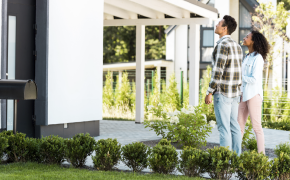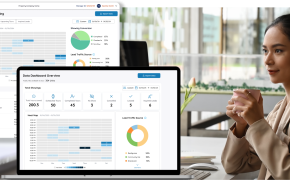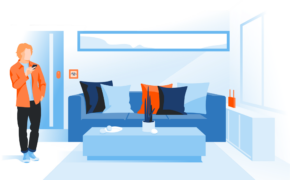Property management is evolving. The era of the full-time, onsite leasing office is slowly giving way to a more efficient “centralized leasing“ approach. With this new model, many traditional leasing tasks no longer require onsite management. Smart home technology supports the centralized leasing model by providing leasing teams with the secure and flexible tools required for remote property management.

Understandably, property managers are often concerned that shifting traditional onsite tasks to remote property management could jeopardize the quality of their work, and even threaten their jobs.
However, while managers will spend less time onsite when controlling leasing tasks remotely, this does not necessarily affect performance or eliminate tasks. It simply requires new remote tools to accomplish the same tasks.
In fact, some leasing tasks actually require less time and achieve better results when managed remotely.
Remote property management tools streamline daily operations and help leasing staff allocate their time more efficiently. By saving time with centralized leasing, staff can focus on more important responsibilities, such as communicating with renters and vendors.
Smart home technology supports centralized leasing where staff spend less time on site but accomplish more tasks, more efficiently.

1. Smart Home Technology Enables Remote Property Management
Centralized leasing WITHOUT robust remote property management tools will likely result in inadequate property management. Offsite leasing teams will not have the real-time property control required to manage daily leasing tasks from offsite.
However, centralized leasing WITH robust remote property management tools results in optimized property management.
To achieve robust remote property management, managers must first install smart home devices that can be quickly controlled from offsite locations (mobile or fixed).
Managers accomplish leasing tasks remotely with smart home automation. For example, properties must have smart locks, smart thermostats, and smart sensors for managers to remotely control property access, minimize utility costs and protect assets.
Smart locks automate property access. Remotely controlling property access allows managers to offer self-guided tours. Self-guided tours eliminate the need for managers to be onsite, saving them time, while touring activity is successfully accommodated.
Managers need not worry that self-guided touring activity diminishes their leasing prospects. In fact, renter surveys show the growing popularity of self-guided tours, with 84% of renters expressing the desire to tour a property autonomously.
Smart Thermostats automate temperature control. Automated temperature control allows managers to remotely control energy usage in vacant units. This provides managers with the ability to avoid wasteful usage in vacant units, and lower their property’s annual operating expenses.
Managers need not worry that smart thermostats are luxury investments. These devices offer real economic value. On average, smart thermostats generate at least a 20% annual utility cost reduction. Renters are eager to benefit from those monthly savings as well. Surveys show that smart thermostats are the most popular smart home device among renters, who are willing to pay higher rental rates for this cost-saving amenity.
Smart Sensors automate property security. Automating property security allows managers to remotely monitor their properties all day, everyday. Traditional property management only allows for occasional on-site unit checks. Meanwhile, remote property management allows for ongoing, property-wide checks and immediate notification of potential property damage or security breaches.
Early alerts prevent small issues from becoming big problems. Therefore, smart sensors provide the type of proactive asset protection that can be persuasive when negotiating lower property insurance premiums.

After installing smart home devices, the next (very important) step to achieve robust remote property management is the activation of a single platform from which all of these smart devices can be monitored and controlled.
As mentioned earlier, the emerging centralized leasing model often relocates leasing staff resources offsite. By providing offsite teams with a single smart home technology portal (viewed on a mobile app or desktop), managers can initiate and track projects from anywhere, anytime. Workflow is enhanced by remote management.

Rently’s Smart Home Manager Portal allows complete control of all devices across all units and locations. It provides managers with valuable insights into their overall leasing operations and offers them a level of control that allows their staff to confidently manage properties from off-site.
From the portal, managers can customize property listings, control property access, and remotely control each unit’s smart devices. Managers can see where their smart technology is deployed and the status of those devices. Leasing staff can see self-touring appointment scheduling, arrivals, and completions. They can also see metrics regarding the number of self-tours that resulted in lease signings. Rently also stores renter surveys and integrates with leading CRM softwares to create streamlined lead management and timely prospect engagement.
Rently integrates seamlessly with property management softwares such as Yardi, RealPage, and Entrata. Managers can download our mobile app or access the portal via desktop.
Rently’s Smart Home Manager Portal enables the remote management of different types of properties. The portal can help managers of a single property with multiple units, or multiple properties spread across a nationwide portfolio.
For managers of single location properties, our smart home portal permits leasing teams to view activities across all units in their building and manage these from an offsite office, or with mobile capability. The previous onsite leasing office space could then be easily repurposed into an appealing community space, such as a gym or renter storage space.

For managers of several properties that are separated by larger distances, our smart home portal permits leasing staff to view all leasing activities across communities or regions. Staff can manage these remotely without having to spend the time to visit each property individually.

Whether implementing a centralized leasing approach across various property portfolios or just within a single community, offsite leasing teams benefit from using smart home technology for remote property management.
2. Smart Home Technology Empowers Centralized Leasing Teams
We have seen how smart home technology facilitates remote property management so that leasing teams can successfully adjust to the new centralized leasing model.
By enabling remote property management, leasing teams gain the confidence and peace-of-mind that they will be able to accomplish their daily leasing tasks, even when they are not onsite.

In addition, leasing teams are discovering that not only does smart technology enable them to accomplish their leasing tasks remotely, but the remote management of those tasks actually enhances their daily work experience.
Offsite leasing managers who utilize smart home technology for property management quickly experience time and cost saving benefits.
For example, by controlling property access remotely, managers no longer have to spend valuable time traveling to properties for tasks that don’t require their immediate attention or expertise. Using a smart home technology platform, managers can remotely initiate renter tours, facilitate unit turnovers, and schedule vendor maintenance appointments. Visitors receive smart lock codes to enter units, and their activity is tracked in real time online. Managers still interact with each property visitor before and after their visit, however, there is no need to be onsite for these tasks to be successfully completed.
As a result, remote property management empowers leasing teams to accomplish more in less time and with less hassle. They can accomplish important onsite tasks, while simultaneously completing other important tasks offsite. To learn about the many benefits of remote property management, please read our blog on the topic.
The centralized leasing model can actually increase the job satisfaction of leasing staff when their workflows by optimizing with smart home technology and remote management. Streamlining leasing tasks reduced stress on leasing teams already stretched by current staffing shortages and properties remain well-managed.
3. Smart Home Technology Scales Centralized Leasing Operations
Another goal of the centralized leasing model is to standardize operations so that operators can quickly and easily scale their property portfolio.
Operators can quickly expand a portfolio by adding new communities that have the same property management platforms. Rently’s smart home platform integrates with all major property management softwares to seamlessly enable remote property management.
Operational scalability depends on having robust remote property management capability. Rently’s smart home platform integrates all types of smart home devices and provides a mobile-friendly, multi-functional management portal.
Smart home technology best suits standardizing automated leasing activities across a growing property portfolio.
With Rently, managers can utilize the same devices and smart home platform across communities, creating a uniform experience across properties.

Centralized leasing also offers new marketing opportunities. Smart home platforms provide managers with instant community-wide or cross-community overviews so they can identify available units to interested renters. Leasing teams can cross-sell across portfolios because they have instant access to see what is available.
Conclusion
The centralized leasing model emerged to help operators respond to the pressures of staffing shortages, tight budgets, and property consolidation.
Smart home technology supports centralized leasing by providing the tools required for remote property management. These tools empower offsite teams to “do more with less” while also scaling their portfolio’s growth.
Rently’s comprehensive smart home technology solution includes a broad portfolio of devices, a robust management platform, and easy installation steps. As leasing models change, Rently’s solutions provide managers with the flexibility to structure their remote leasing activities in whichever way that works best for their property and staff.




